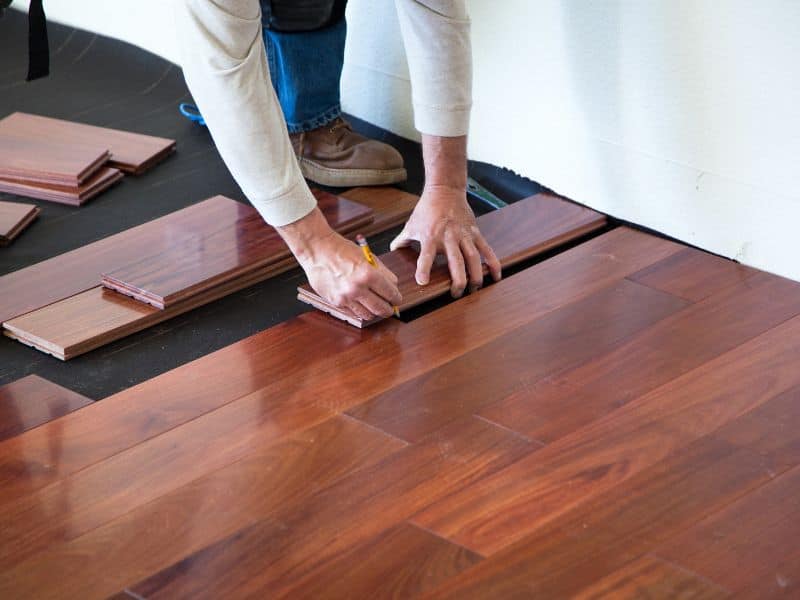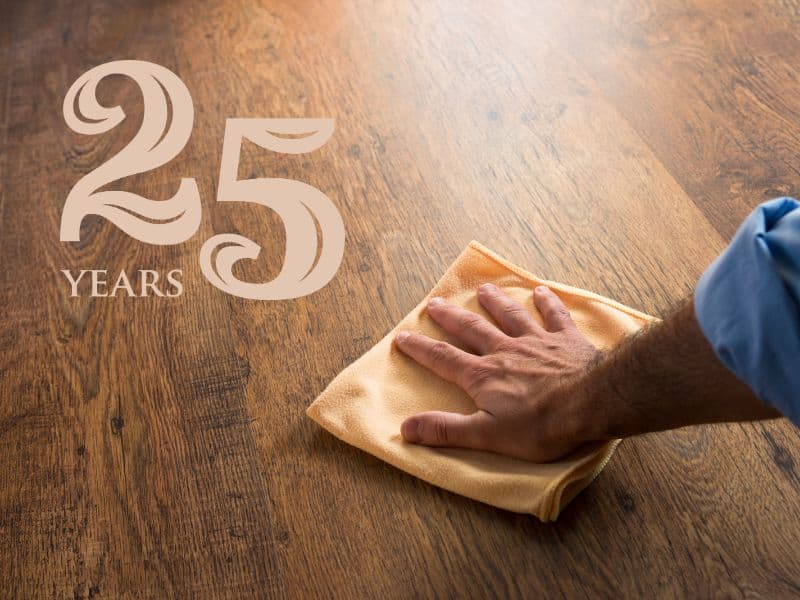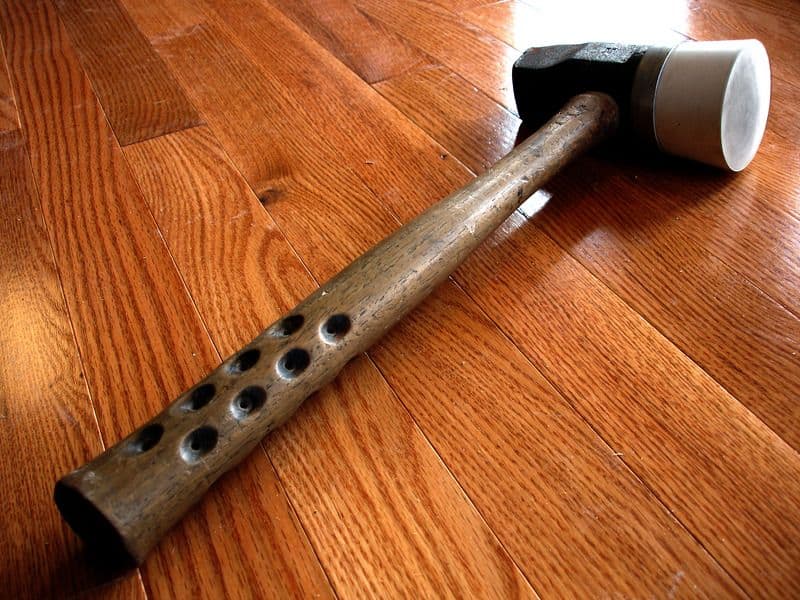Engineered Hardwood Flooring: Better Than Solid Hardwood?

When it comes to flooring, you want something that’s both beautiful and durable.
For many, hardwood floors check off both boxes — but solid hardwood isn’t your only option.
Engineered hardwood is quickly becoming the go-to choice for those looking for the benefits of wood flooring in a sustainable home.
But what exactly makes engineered hardwood flooring such an appealing alternative?
Due to its high stability, engineered hardwood flooring is better than solid hardwood in high-moisture environments like kitchens, basements, and bathrooms. However, solid hardwood flooring takes the lead in longevity because of its solid nature, which allows it to be refinished multiple times.
In the rest of this article, I’ll compare the key features of engineered hardwood flooring and solid hardwood.
By comparing the main features of these flooring types, you can decide which one is best for your home.
Let’s get started!
The Key Features of Engineered Hardwood Flooring and Solid Hardwood

The table below summarizes the key features of engineered hardwood flooring and solid hardwood:
| Key Feature | Engineered Hardwood Flooring | Solid Hardwood Flooring |
| Cost | $4-$7 per square foot | $8-$15 per square foot |
| Lifespan | 25-30 years | 30-100 years |
| Materials | Plywood core attached to a thin hardwood veneer layer | 100% hardwood |
| Moisture | Highly resistant to moisture compared to solid hardwood but not waterproof | Moisture-resistant but not waterproof |
| Core | Plywood | Hardwood |
| Cleaning | Wet mop allowed | Wet mop not allowed |
| Sizes | Thickness: 0.38-0.56 inch (9.65-14.22mm)Width: 2.25-7 inches (57.15-177.8mm)Length: 12-60 inches (304.8-1,524mm) | Thickness: About 0.75 inch (19.05mm)Width: 2.25-4 inches (57.15-101.6mm)Length: 12-84 inches (304.8-2,133.6mm) |
Table 1: The key features of engineered hardwood flooring and solid hardwood. Source: Forbes
What Are the Disadvantages of Engineered Wood Flooring?
The disadvantages of engineered wood flooring include the following:
- Regular maintenance: Engineered wood flooring requires a great deal of maintenance due to the thin layer of hardwood veneer that makes the wear layer. Since the veneer is thinner than solid wood, it’s more susceptible to dents and scratches.
- Unsuitable for refinishing: Refinishing engineered wood floors is not advisable as this may expose the core layer. When this happens, the wooden floor becomes more susceptible to moisture damage.
- Shorter lifespan: Unlike solid hardwood floors, engineered floors have a shorter lifespan of about 25 to 30 years.
- Susceptible to sun damage: UV radiation weakens the chemical bonds in engineered wood flooring. Weakened bonds mean the layers can separate when someone walks over the floor.
Can You Tell the Difference Between Hardwood and Engineered Hardwood?

You can tell the difference between hardwood and engineered hardwood by inspecting the planks from their sides. If you see layers of wood held together by adhesives, then that’s engineered hardwood.
On the other hand, if you see a solid piece of wood with a continuous grain pattern, it’s hardwood.
Needless to say, it’s impossible to tell the difference between hardwood and engineered hardwood by looking at them from the top. Since the top layer of engineered hardwood is covered with a hardwood veneer, solid hardwood and engineered hardwood look similar.
Is Engineered Hardwood as Durable as Hardwood?
Engineered hardwood is less durable than hardwood because the layers are held together by adhesives. These adhesives weaken over time and can eventually break, causing the wood planks to separate.
On the other hand, hardwood is a solid piece of wood that does not contain any adhesives. As such, it’s much more durable than engineered hardwood and can withstand pressure better over time.
Why Is Engineered Hardwood Better?
Engineered hardwood is better because it’s designed to be highly stable. The cross-grain layered design of engineered hardwood makes it highly resistant to contraction and expansion due to temperature and moisture variations.
Consequently, these woods are ideal for high-moisture environments like bathrooms, kitchens, and basements.
Does Engineered Hardwood Decrease Home Value?
Although engineered hardwood doesn’t decrease a home’s value, it doesn’t increase it as much as solid hardwood. This is because engineered hardwood is not considered premium quality. Therefore, it’s not an essential selling point for potential homebuyers.
Do Engineered Wood Floors Look Cheap?
Engineered wood floors don’t look cheap because the wear layer is made from a hardwood veneer that looks like solid wood. Therefore, you can only distinguish between them if you inspect their sides.
Moreover, if installed well by fixing the click-and-lock systems correctly, engineered wood floors look as beautiful as solid hardwood.
Which Hardwood Floor Is Best?
The best hardwood floor is made from tougher tree species that are readily available. Such hardwood floors include maple flooring, oak flooring, and cherry flooring. These floors can last a lifetime due to the hardy nature of the tree species they are made from.
How Many Years Does Engineered Hardwood Last?

Engineered hardwood lasts between 25 and 30 years, depending on the plank’s thickness. Engineered hardwoods with thicker planks last longer than those with thinner planks. Therefore, if you’re looking for long-lasting engineered wood, choose the one with the thickest planks.
Is Engineered Hardwood Low Quality?
Engineered hardwood is not low-quality because it’s designed to resemble solid hardwood but with higher stability. It’s also aesthetically pleasing due to the hardwood veneer in its wear layer. Therefore, the misconception that engineered hardwood is low quality doesn’t hold water.
Can I Mop Engineered Hardwood Floors?
You can mop engineered hardwood floors with a damp mop. Although these floors withstand moisture better than their solid hardwood counterparts, they are not waterproof. Therefore, you should avoid puddles of standing water on your engineered hardwoods as it can damage the wood planks.
Do Engineered Wood Floors Scratch Easily?
Engineered wood floors scratch easily because the top layer is made from a hardwood veneer. Like solid wood, the top layer is susceptible to dents, scratches, and other marks.
An excellent way to prevent scratches and dents is to use extra rugs, mats, and other protective coverings in areas with high foot traffic, such as kitchens, hallways, and living rooms.
Do Engineered Hardwood Floors Dent Easily?

Engineered hardwood floors dent easily because their top layers are made from hardwood veneer. This top layer is the only part of engineered hardwood susceptible to pressure, chipping, and denting.
You can avoid stepping on the floors with shoes to prevent this from happening. Alternatively, wipe the shoes on a doormat before stepping on the floor to prevent scratching the wood.
Final Thoughts
While engineered hardwood flooring takes the lead in versatility, cost-effectiveness, and stability, solid hardwood wins in durability and increases a home’s resale value.
Ultimately, engineered hardwood flooring and solid hardwoods can improve any home décor.
The best thing you can do is to consider your needs and budget before deciding which one to choose.
Now that you know about engineered hardwood flooring and solid hardwood, here are the healthiest renewable building materials to build with.







